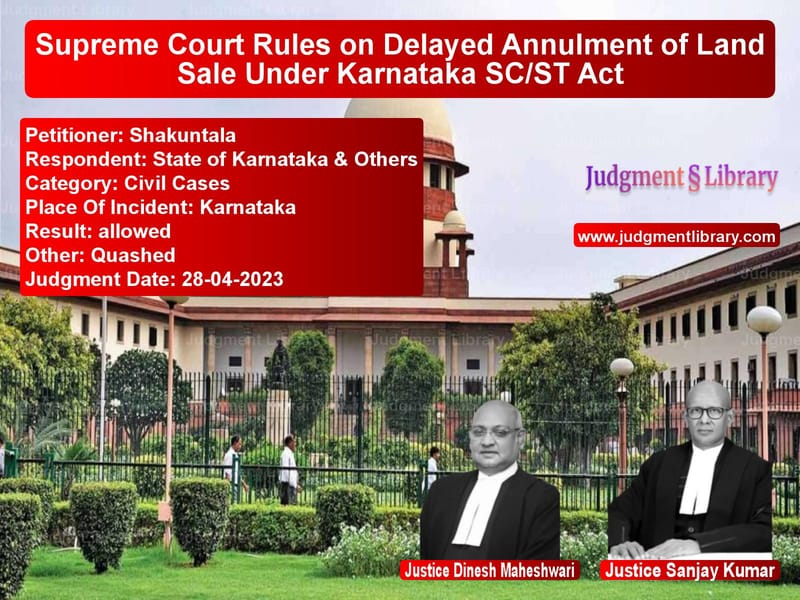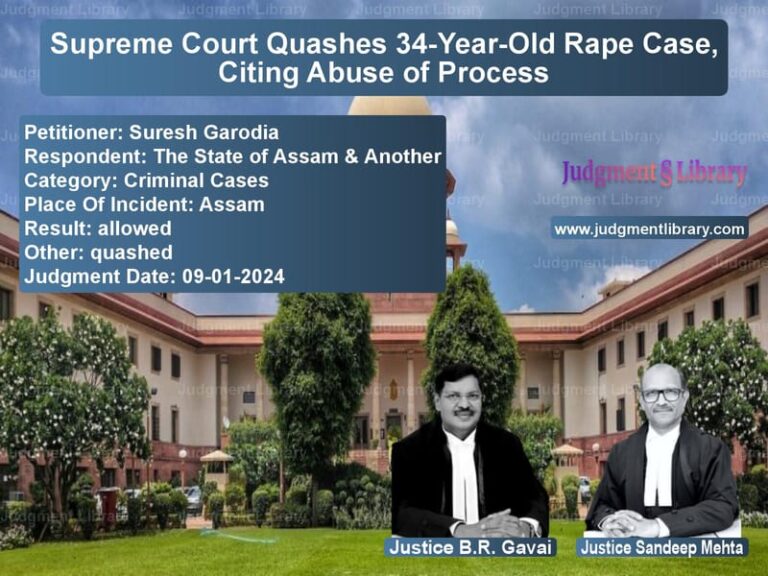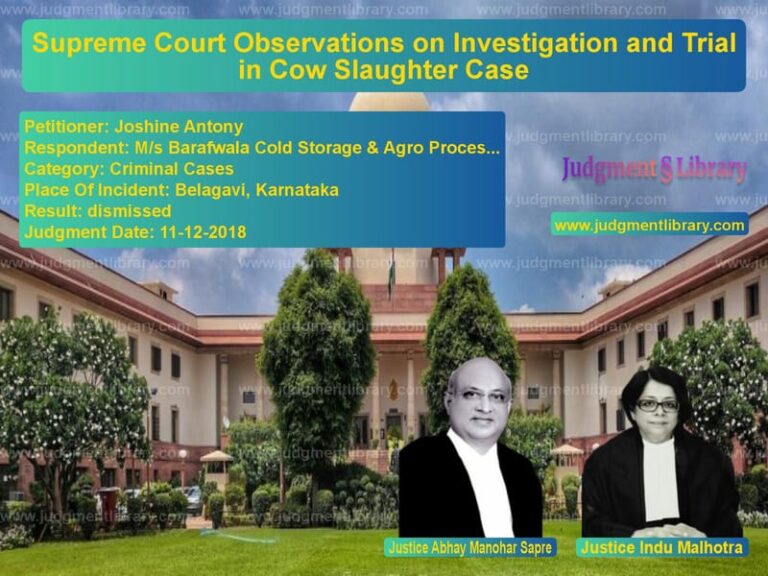Supreme Court Rules on Delayed Annulment of Land Sale Under Karnataka SC/ST Act
The Supreme Court of India recently ruled in the case of Shakuntala v. State of Karnataka & Others, addressing the question of whether a long delay in invoking statutory rights under the Karnataka Scheduled Castes and Scheduled Tribes (Prohibition of Transfer of Certain Lands) Act, 1978 (referred to as the Act of 1978) could impact the enforcement of those rights.
The case involved agricultural land granted to a Scheduled Caste beneficiary, which was subsequently sold in violation of the grant’s conditions. The Supreme Court held that an inordinate delay of 43 years in seeking annulment of the land sale was unreasonable and ruled in favor of the appellant, setting aside the orders of the Karnataka High Court and the authorities that had ordered the restitution of the land.
Case Background
The original land grantee, Somalanayak, was allotted four acres of agricultural land in Karnataka in 1957 under the Depressed Class Rules. As per the grant conditions, the land was not to be alienated for 15 years. However, Somalanayak sold the land in 1964, well before the restriction period had expired.
The land subsequently changed hands multiple times:
- 1964: Sold by Somalanayak to Bomme Gowda.
- 1974: Sold by Bomme Gowda’s wife, Ningamma, to K.G. Rajanna.
- 1996: Sold by K.G. Rajanna to N. Indramma and others.
- 2001: Purchased by the appellant, Shakuntala, under a registered sale deed.
In 1979, the Act of 1978 came into force, declaring that any transfer of granted land in violation of the grant conditions was null and void. However, the legal heir of Somalanayak, Neelyanayak, did not take any action to reclaim the land until 2007.
Legal Proceedings
Neelyanayak’s Petition
In 2007, nearly 43 years after the original sale, Neelyanayak filed an application under Section 4 of the Act of 1978, seeking to annul the past sale transactions and reclaim the land.
Assistant Commissioner’s Order
In 2008, the Assistant Commissioner held that the original grant was subject to the prohibitions of the Act of 1978. The sales were declared null and void, and the land was ordered to be restored to the legal heir of Somalanayak.
Subsequent Appeals
The appellant, Shakuntala, challenged this order through a series of appeals:
- The Deputy Commissioner dismissed her appeal in 2009.
- The Karnataka High Court’s Single Judge dismissed her writ petition in 2010.
- She filed a writ appeal before a Division Bench, which was also dismissed in 2014.
- In 2015, the High Court directed the authorities to act on the restitution of land.
- The appellant then moved the Supreme Court.
Supreme Court’s Observations
Issue of Delay
The primary issue before the Supreme Court was whether the extreme delay in filing for annulment under the Act of 1978 should bar relief.
The Court noted:
“The admitted facts indicate that Somalanayak was granted this agricultural land in 1957 and chose to sell it in the year 1964. The Act of 1978 came into force on 01.01.1979, but it was only in 2007 that respondent No. 5 woke up and filed a petition under Section 4 thereof.”
The Court emphasized that the delay of 43 years, during which the land changed hands four times, could not be ignored.
Precedents on Delay and Laches
The Court cited multiple cases that reinforce the principle that statutory provisions must be invoked within a reasonable time:
- Nekkanti Rama Lakshmi v. State of Karnataka (2020): Held that a 25-year delay in filing under the Act of 1978 was barred.
- Vivek M. Hinduja v. Ashwatha (2020): The Court ruled that even a 20-year delay was too long to allow the annulment of a sale.
- Ningappa v. Deputy Commissioner (2020): A 16-year delay was found excessive for claiming restoration.
- Shivanna (Dead) v. State of Karnataka (2021): A 21-year delay in filing for annulment was ruled to be unreasonable.
Based on these precedents, the Supreme Court held that the annulment proceedings initiated after 43 years could not be sustained.
Innocent Purchaser Protection
The Court noted that Shakuntala was an innocent purchaser who had acquired the land in 2001 without any knowledge of the restrictions imposed by the Act. She had also availed a loan from Vijaya Bank, which would have conducted due diligence.
The judgment emphasized:
“Being an innocent purchaser of the land in the year 2001, long after its first sale in 1964, the appellant is not liable to be ousted therefrom, overlooking the long delay and patent laches on the part of respondent No.5.”
Supreme Court’s Final Ruling
The Supreme Court ruled in favor of the appellant and held that the Karnataka High Court and the state authorities had erred in blindly enforcing the Act of 1978 without considering the unreasonable delay.
Accordingly, the Supreme Court:
- Set aside the orders of the Karnataka High Court.
- Quashed the orders passed by the state authorities.
- Allowed Shakuntala to retain possession of the land.
Significance of the Judgment
This judgment sets a crucial precedent for cases involving statutory land restoration claims under the Act of 1978. It establishes that:
- Even if a statute does not prescribe a limitation period, claims must be filed within a reasonable time.
- Prolonged inaction on the part of claimants can bar relief.
- Innocent purchasers who buy land without knowledge of restrictions must be protected.
By reaffirming the principle that justice cannot be delayed indefinitely, the Supreme Court has provided much-needed clarity on how courts should handle long-pending claims under land restoration laws.
Petitioner Name: Shakuntala.Respondent Name: State of Karnataka & Others.Judgment By: Justice Dinesh Maheshwari, Justice Sanjay Kumar.Place Of Incident: Karnataka.Judgment Date: 28-04-2023.
Don’t miss out on the full details! Download the complete judgment in PDF format below and gain valuable insights instantly!
Download Judgment: shakuntala-vs-state-of-karnataka-&-supreme-court-of-india-judgment-dated-28-04-2023.pdf
Directly Download Judgment: Directly download this Judgment
See all petitions in Property Disputes
See all petitions in Succession and Wills
See all petitions in Judgment by Dinesh Maheshwari
See all petitions in Judgment by Sanjay Kumar
See all petitions in allowed
See all petitions in Quashed
See all petitions in supreme court of India judgments April 2023
See all petitions in 2023 judgments
See all posts in Civil Cases Category
See all allowed petitions in Civil Cases Category
See all Dismissed petitions in Civil Cases Category
See all partially allowed petitions in Civil Cases Category







